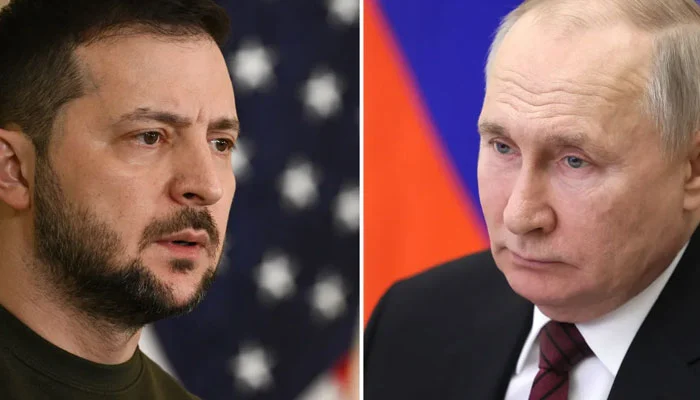Ukrainian President Volodymyr Zelensky has dismissed Russian leader Vladimir Putin’s call for a short ceasefire as nothing more than a theatrical show.
He stated that Ukraine is open to a real, lasting peace — not a three-day pause timed to make Russia look good during its May 9 celebrations.
Moscow said the truce, set to coincide with its World War II commemorations on May 9, was aimed at testing Kyiv’s “readiness” for long-term peace. It also accused Zelensky of making a “direct threat” to events on the holiday.
The Kremlin rejected an unconditional 30-day ceasefire proposed by Kyiv and Washington in March, and Putin has since offered little to end the three-year Russian invasion.
“This is more of a theatrical performance on his part. Because in two or three days, it is impossible to develop a plan for the next steps to end the war,” Zelensky said.
He was speaking Friday to a small group of journalists including AFP in remarks embargoed until Saturday.
Some in Ukraine have criticized the truce as an attempt to prevent Kyiv from disrupting the World War II anniversary celebrations. Foreign leaders are due in Moscow to watch a military parade on Red Square and an address by Putin.
Zelensky said Ukraine would not be “playing games to create a pleasant atmosphere to allow for Putin’s exit from isolation on May 9”.
Leaders headed to Moscow
In his evening address, the Ukrainian leader added he saw no “readiness” for a longer-term ceasefire on Russia’s part.
Kremlin spokesman Dmitry Peskov told reporters the short, three-day truce was aimed at testing “Kyiv’s readiness to seek ways to achieve long-term sustainable peace”.
Russian shelling killed two people in Ukraine’s eastern Donetsk region on Saturday, while a drone strike on the southern Ukrainian city of Kherson left one other person dead, regional officials said.
Russian authorities meanwhile accused Ukraine of an overnight attack on the southern port city of Novorossiysk, damaging apartment buildings and injuring five people.
Leaders of around 20 countries, including China’s Xi Jinping, have accepted invitations to join the May 9 celebration, according to the Kremlin.
Zelensky said some countries had approached Kyiv to warn they were travelling to Russia and had requested safety.
“Our position is very simple towards all countries that have travelled or are travelling to Russia on May 9 – we cannot take responsibility for what is happening on the territory of the Russian Federation,” he said.
“They are ensuring your safety,” Zelensky said, adding that Russia “may take various steps on its part, such as arson, explosions, and so on and then blame us”.
Zelensky did not say what Ukraine would do during the truce, but Russia jumped on the comments, accusing Kyiv of making a “direct threat” to the commemorations.
“He is threatening the physical safety of veterans who will come to parades and celebrations on the holy day,” foreign ministry spokeswoman Maria Zakharova said on Telegram. “His statement… is, of course, a direct threat.”
‘See things differently’
Russian officials have promised grand celebrations for the occasion, during which Putin will seek to rally support for his troops fighting in Ukraine.
Russian troops have been making gruelling gains on several parts of the front, as both Moscow and Kyiv have stepped up their aerial attacks.
The United States has warned it could abandon efforts to broker a ceasefire if it does not see progress.
Washington is seeking “a complete, durable ceasefire and an end to the conflict”, rather than a “three-day moment so you can celebrate something else”, US State Department spokesperson Tammy Bruce said this week.
President Donald Trump has overhauled US policy towards Russia since taking office, initiating a rapprochement with the Kremlin.
There was an on-camera clash between Trump and Zelensky at the White House on February 28, where both leaders had been set to sign a mineral deal granting US access to Ukrainian resources in exchange for some protection.
Ukraine has since renegotiated the deal, which would see Washington and Kyiv jointly develop and invest in Ukraine’s critical mineral resources.
Zelensky on Friday said the deal was beneficial to both sides and protected Ukraine’s interests, even though the accord offers no concrete security guarantees for Kyiv.
That followed a meeting between Trump and Zelensky at the end of April before Pope Francis’s funeral at the Vatican, the first encounter since their public clash.
“We had the best conversation out of all those that preceded it,” Zelensky said Friday.
“I am confident that after our meeting in the Vatican, President Trump began to look at things a little differently.”



